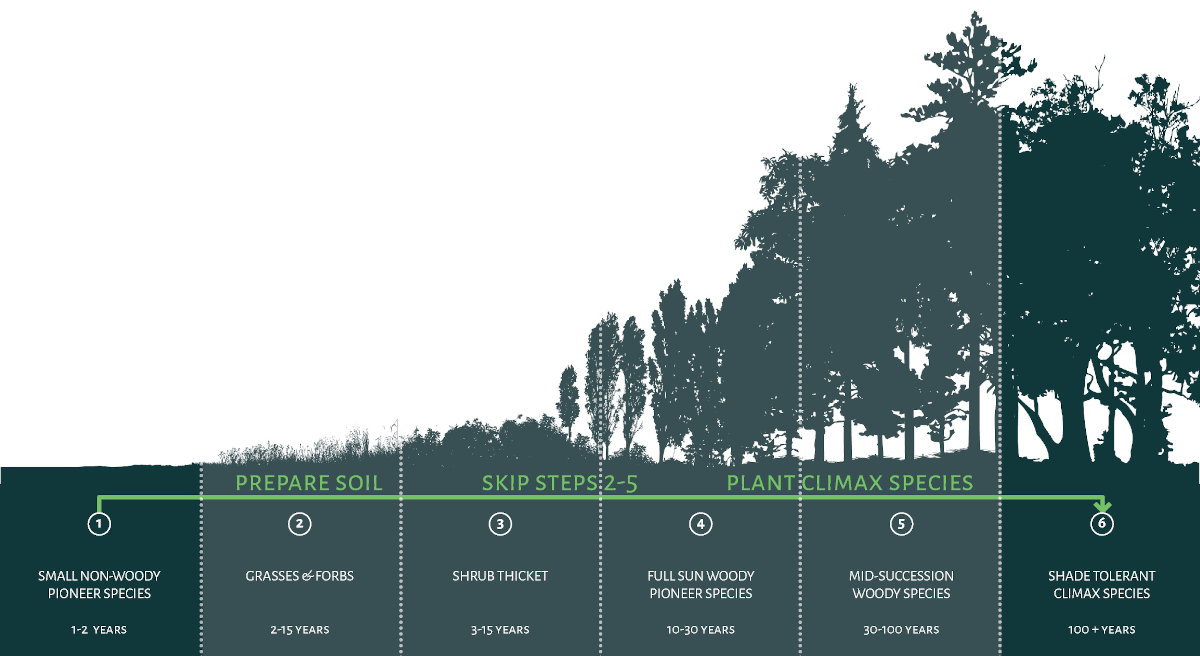
We collect basic website visitor information on this website and store it in cookies. We also utilize Google Analytics to track page view information to assist us in improving our website.
Written by: Heather Schibli
The benefits of planting trees have been well documented. In fact, several cities have adopted policies to increase urban tree canopy percentages. However, these plantings are typically reserved to publicly owned lands. How can we best maximize the urban canopy? Planting individual trees helps, but what if we could reintroduce forests within our communities?
Trees perform one of the most effective strategies to counter the rise of carbon dioxide emissions by sequestering photosynthetic carbon. A recent study has found that the world’s forests sequestered about twice as much carbon dioxide as they emitted over the last two decades. And yet, over these same two decades, global forest cover diminished by 99,119,000 hectares. Many initiatives, inspired by global assessments of tree and forest capacity to curtail emissions, have been proposed to mitigate climate change through tree planting.
Miyawaki Forests (MF), small scale densely planted native urban forests, have been successfully grown on private properties in Japan and elsewhere for more than forty years. The Miyawaki Forest method of planting, named for the botanist who developed it, encourages tree communities to grow upward and to share resources, while the dense structure dissuades human interference. This process of urban afforestation in tight spaces can accelerate climax forest establishment from 100+ years down to 20 years by skipping earlier stages of succession.
Consisting of late succession species planted into richly prepared soils, these forest plots boast a minimum diversity of 30 locally native species divided into four structural layer categories; Canopy trees, sub-canopy trees, arborescent trees (small understory trees), and shrubs.

Miyawaki Forests are not replacements for our natural forests, but rather, a means to reforest urban and ecologically degraded settings that in turn provide:
• Added greenery
• Improved air quality
• Surface stormwater runoff mitigation
• A counter to heat island effect
• Habitat
• And a reduction in noise pollution.
With support from the Landscape Architecture Foundation of Canada (LACF), and in partnership with Carolinian Canada Coalition and Green Venture, Network of Nature is piloting a study on Miyawaki Forest establishment in Canada. Our study is well timed! Not only do trees abate climate change, they also benefit human health.
There is a growing body of research that supports the link between connections with nature and human wellbeing. This has become increasingly apparent during 2020 with the implementation of ‘lock-down’ policies to manage the COVID-19 pandemic.
Trends in Canada point to loneliness, anxiety and/or lethargy linked to isolation and increased indoor time. Subsequently, Canadians who reported having more exercise outdoors benefited from better mental health. This is consistent with trends in Europe, and the argument that COVID-19 should be the impetus for creating more green space in urban areas.
Our climate and biodiversity crises stem in part from our manipulation of the landscape. Be it extracting crude oil, introducing invasive species, or flattening forests, our profound alteration of our planet’s landscapes has led to astonishing outcomes. It is time we reintroduce what has been stripped by replanting our forests in an effort to heal from the ecological trauma we have caused.
Whether grown in public or private spaces, establishing Miyawaki Forests could be part of this solution. It is our hope that this pilot study will help launch a movement of these urban forest plantings across Canada.
Successes attributed to MFs include rapid growth and self-sustenance post establishment period. The proven successes of MF establishment, health, vigour, and longevity have inspired Network of Nature to assist various environmental organizations test and implement Miyawaki Forest theories and practices in Canada.
If you or someone you know is considering planting a Miyawaki Forest, let us know! We would love to collaborate!
Join our email list to receive occasional updates about Network of Nature and ensure you get the news that matters most, right in your inbox.